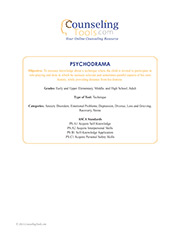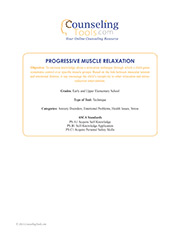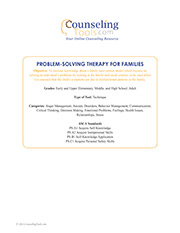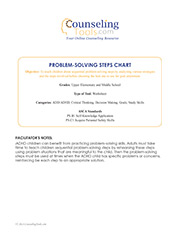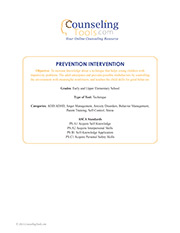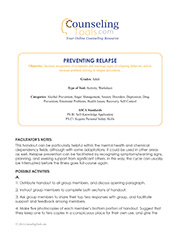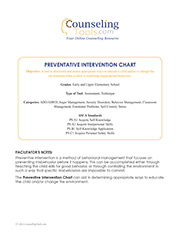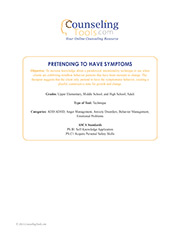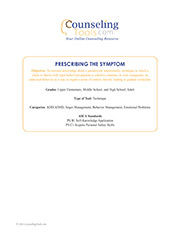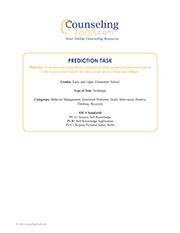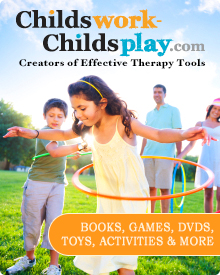-
-
TopicsAnxiety Disorders, Depression, Divorce, Emotional Problems, Loss & Grieving, Recovery, Stress
- Objective
To increase knowledge about a technique where the child is invited to participate in role-playing and skits in which he reenacts relevant and sometimes painful aspects of his own history, while providing distance from his distress.
- Types of ToolsTechnique
- GradesAdult, Early Elementary School, High School, Middle School, Upper Elementary School
- ASCA StandardsPS:A1: Acquire Self-Knowledge, PS:A2 Acquire Interpersonal Skills, PS:B1 Self-Knowledge Application, PS:C1 Acquire Personal Safety Skills
- Number of pages2
-
-
-
TopicsAnxiety Disorders, Emotional Problems, Health Issues, Stress
- Objective
- Types of ToolsTechnique
- GradesEarly Elementary School, Upper Elementary School
- ASCA StandardsPS:A1: Acquire Self-Knowledge, PS:B1 Self-Knowledge Application, PS:C1 Acquire Personal Safety Skills
- Number of pages2
-
-
-
TopicsAnger Management, Anxiety Disorders, Behavior Management, Communication, Critical Thinking, Emotional Problems, Feelings, Health Issues, Relationships, Stress
- Objective
- Types of ToolsTechnique
- GradesAdult, Early Elementary School, High School, Middle School, Upper Elementary School
- ASCA StandardsPS:A1: Acquire Self-Knowledge, PS:A2 Acquire Interpersonal Skills, PS:B1 Self-Knowledge Application, PS:C1 Acquire Personal Safety Skills
- Number of pages3
-
-
-
TopicsADD/ADHD, Critical Thinking, Goals, Study Skills
- Objective
To teach children about sequential problem-solving steps by analyzing various strategies and the steps involved before choosing the best one to use for goal attainment.
- Types of ToolsWorksheet
- GradesMiddle School, Upper Elementary School
- ASCA StandardsPS:B1 Self-Knowledge Application, PS:C1 Acquire Personal Safety Skills
- Number of pages2
-
-
-
TopicsADD/ADHD, Anger Management, Anxiety Disorders, Behavior Management, Parent Training, Self-Control, Stress
- Objective
To increase knowledge about a technique that helps young children with impulsivity problems. The adult anticipates and prevents possible misbehaviors by controlling the environment with meaningful reinforcers, and teaches the child skills for good behavior.
- Types of ToolsTechnique
- GradesEarly Elementary School, Upper Elementary School
- ASCA StandardsPS:A1: Acquire Self-Knowledge, PS:A2 Acquire Interpersonal Skills, PS:B1 Self-Knowledge Application, PS:C1 Acquire Personal Safety Skills
- Number of pages3
-
-
-
TopicsAlcohol and Drug Prevention, Anger Management, Anxiety Disorders, Depression, Health Issues, Recovery, Self-Control
- Objective
Increase recognition of symptoms and warnings signs of relapsing behavior, and to increase problem-solving in relapse prevention.
- Types of ToolsActivity, Worksheet
- GradesAdult
- ASCA StandardsPS:B1 Self-Knowledge Application, PS:C1 Acquire Personal Safety Skills
- Number of pages3
-
-
-
TopicsADD/ADHD, Anger Management, Anxiety Disorders, Behavior Management, Classroom Issues, Emotional Problems, Self-Control, Stress
- Objective
A tool to document and assess appropriate ways to educate a child and/or to change the environment when a child is exhibiting inappropriate behaviors.
- Types of ToolsAssessment, Worksheet
- GradesEarly Elementary School, Upper Elementary School
- ASCA StandardsPS:A1: Acquire Self-Knowledge, PS:A2 Acquire Interpersonal Skills, PS:B1 Self-Knowledge Application, PS:C1 Acquire Personal Safety Skills
- Number of pages2
-
-
-
TopicsADD/ADHD, Anger Management, Anxiety Disorders, Behavior Management, Emotional Problems
- Objective
To increase knowledge about a paradoxical intentionality technique to use when clients are exhibiting mindless behavior patterns that have been resistant to change. The therapist suggests that the client only pretend to have the symptomatic behavior, creating a playful, constructive tone for growth and change.
- Types of ToolsTechnique
- GradesAdult, High School, Middle School, Upper Elementary School
- ASCA StandardsPS:B1 Self-Knowledge Application, PS:C1 Acquire Personal Safety Skills
- Number of pages3
-
-
-
TopicsADD/ADHD, Anger Management, Behavior Management, Emotional Problems
- Objective
To increase knowledge about a paradoxical intentionality technique in which a client or family with rigid behavioral patterns is asked to continue, or even exaggerate, an undesired behavior as a way to regain a sense of control, thereby leading to gradual extinction.
- Types of ToolsTechnique
- GradesAdult, High School, Middle School, Upper Elementary School
- ASCA StandardsPS:B1 Self-Knowledge Application, PS:C1 Acquire Personal Safety Skills
- Number of pages3
-
-
-
TopicsBehavior Management, Emotional Problems, Goals, Motivation, Positive Thinking, Recovery
- Objective
To increase knowledge about a technique in which paradoxical intention is used as a way to give control back to the child to make positive behavioral changes.
- Types of ToolsTechnique
- GradesEarly Elementary School, Upper Elementary School
- ASCA StandardsPS:A1: Acquire Self-Knowledge, PS:B1 Self-Knowledge Application, PS:C1 Acquire Personal Safety Skills
- Number of pages2
-
- Home
- Topics
- ADD/ADHD
- Adoption
- Alcohol and Drug Prevention
- Anger Management
- Anxiety Disorders
- Asperger's Syndrome
- Assertiveness
- Autism Spectrum
- Behavior Management
- Body Image
- Bullying and Cyberbullying
- Career Exploration
- Character Education
- Classroom Issues
- Cliques
- Communication
- Types of Tools
- Grades
- ASCA Standards
- A:A1 Improve Academic Self-Concept
- A:A2 Acquire Skills for Improving Learning
- A:A3 Achieve School Success
- A:B1 Improve Learning
- A:B2 Plan to Achieve Goals
- A:C1 Relate School to Life Experiences
- C:A1 Develop Career Awareness
- C:A2 Develop Employment Readiness
- C:B1 Acquire Career Information
- C:B2 Identify Career Goals
- C:C1 Acquire Knowledge to Achieve Career Goals
- PS:A1: Acquire Self-Knowledge
- PS:A2 Acquire Interpersonal Skills
- PS:B1 Self-Knowledge Application
- PS:C1 Acquire Personal Safety Skills
- About Us
- Contact Us


 Post Forms here
Post Forms here
